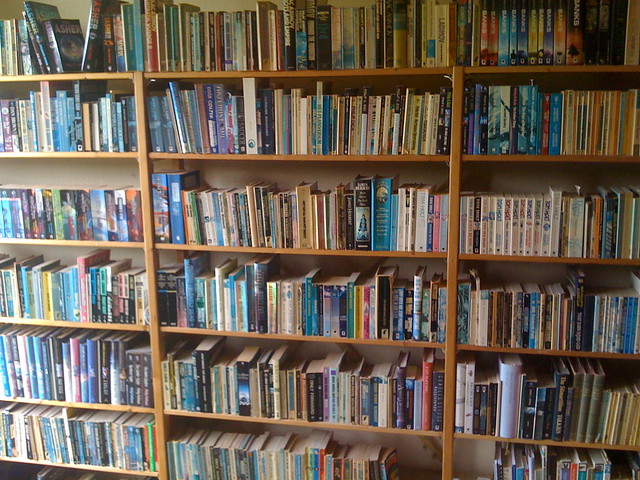
(Image credit: Harold Bakker)
When I was growing up, my house had a 50 foot wall full of books which our family had inherited from my grandfather with the house. Whenever I was bored, and the weather was ugly, I would pick a book off the shelf and read it. I devoured books from the shelves, some of which were probably inappropriate for my age, and some of which are considered classics. The library available in my home helped me become a better reader because I never ran out of something to read.
This is an experience my son has now, because we have a library of books in his room (albeit a much smaller library). However, as books become digital, it will be much more difficult for our library to be visible and accessible to my son. Parents will tend to make more choices of what their children should read. Licensing on books that prevents them from being copied means that children will likely have to explicitly ask for permission for every book that they read from their parent’s collection. Books will be selected less at random, and because we will be more likely to select books entirely based on our own interests, we will be less likely to be exposed to new information. Note that it would be relatively straight forward to set up "book servers" in houses that could act as personal libraries, and serve the same function, but current digital rights management on books makes this impractical (not impossible, every DRM has its weaknesses).
We are headed toward a society where books are not visible and accessible in our houses. If the books are invisible, they might as well not be there.
John at TestSoup says:
I agree that we’re more likely to choose something that we can see over something that we have to look for, but perhaps there is a shift coming for people who grow up with this as the standard way media is stored.
For example: I have a much easier time picking a movie off Netflix than I ever did at a Blockbuster. I also always have a list of books to download and read on my Kindle. Why? Because I can sift through so many online.
Another interesting idea is to combine the two approaches. Mark Isero of http://www.iserotope.com (great education blog)envisions a library with a single physical copy of as many books as possible. But you don’t check out the physical book. You rent the digital copy on your Kindle. I think that may be optimal, as it allows all types of people to pick something to read.
PS: It would be awesome if I could subscribe to any responses to this, so that I could continue a conversation without having to remember to check back. Food for thought!
April 19, 2012 — 10:58 am
David Wees says:
The issue with using a public library for this is that choice of book is still under the gaze of an adult.
Subscriptions are useful, but the system I was using was notifying people even when the new comments were spam, which is problematic…I’ll look into it again.
April 19, 2012 — 2:49 pm
Richard Kassissieh says:
What happens when it’s easy to browse the electronic interface for new and interesting titles? In our house, we have a wall of books, and we also have a Kindle. Guess which source my 10 year-old son uses for new books? It’s almost always the Kindle. No matter where he is located, when he finishes one book, he can immediately browse the Kindle Store for a new title. I influence his browsing more by teaching him to use book recommendations and book lists than by recommending specific titles. True, we are losing the family history of reviewing just the books that we read when we were young, but if we value that enough, then surely we should put some effort into sharing an electronic collection with our kids!
April 24, 2012 — 3:49 pm
David Wees says:
Does this result in a purchase history for his books? Are you able to track what he is reading? If so, then there’s a problem because much adolescent exploration happens outside of the view of parents, and I’m sure that in literature rich families, much of that exploration happens through text.
Here’s an example. When I was 12, I found one of my mom’s romance novels, which as it turns out, was quite steamy and had a very sexy front cover. I did not read this book because of the romance, I was interested in what sex was all about. My mother happened to discover me reading this book, even though I took care not to get caught, and she laughed at me (I’ve since forgiven her, but I still remember the experience 20 years later – which is telling). There are often poor parental responses to adolescent fantasies (often because parents have forgotten their own adolescent fantasies, and/or do not get many opportunities to know of these experiences of their children).
Kids need opportunities to read and explore books outside of the influence of adults. It’s one of the ways kids establish identity.
April 24, 2012 — 4:13 pm
Mary Williams says:
I currently have a small library that I’ve been keeping for years. I plan to have my kids read for at least an hour a day from my library. Although, I think this will prove to be challenging, because they will want to spend most of their time on the computer or tablet. We can’t fight time. As technology keeps evolving, things like newspapers and books will end up being yesterday’s news. Newspapers are already obsolete.
October 25, 2012 — 1:06 am